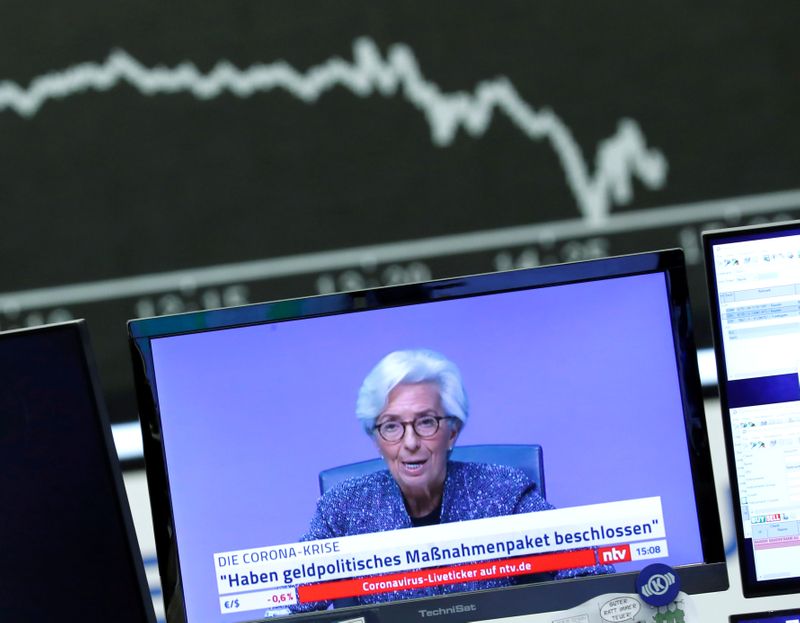By Balazs Koranyi, Francesco Canepa and Frank Siebelt
FRANKFURT (Reuters) - The European Central Bank has asked staff to study whether it should buy "junk" corporate bonds as it comes under growing pressure to help the economy cope with the fallout from the coronavirus pandemic, four sources told Reuters.
Adding company debt recently downgraded to speculative grade to the central bank's 1.1 trillion euro ($1.2 trillion) shopping list for this year would help the ECB bring down borrowing costs for companies that have been hit hardest by the health crisis.
But it would also lead to the risk of recording losses on those purchases if the companies eventually go bust, opening up the ECB to even more criticism at a time it is already under scrutiny in Germany for buying government bonds.
The sources said ECB staff have been tasked with weighing up the pros and cons of buying high-yield credit and presenting them to policymakers. The conversation was due to start last week at a policy seminar but it was postponed at short notice.
The sources said several policymakers remained unconvinced though a majority in favour might be found due to growing market pressure on the ECB to follow the U.S. Federal Reserve.
The Fed said last month it would buy junk bonds, so long as they had been deemed investment grade on March 22, offering a lifeline to riskier credit markets.
An ECB spokesman declined to comment.
When asked about the idea last week, ECB President Christine Lagarde said the bank would not tolerate "fragmentation of monetary transmission", a hint she may be open to the idea.
The sources said, however, the issue remained an open question and no policy proposal had been put forth.
RECESSION HITS
One of the arguments for buying high-yield bonds is that the universe of investment-grade credit in the euro zone which the ECB can already buy under existing programmes, is set to shrink as the recession takes its toll on company balance sheets.
That may be particularly relevant for euro zone members such as Italy. The country is at risk of losing its investment-grade sovereign rating and if it does get downgraded to junk, it would probably take some domestic companies with it.
Furthermore, the ECB is already accepting corporate bonds that have been downgraded by ratings agencies to speculative grade since April 7 as collateral, giving it a template for how the purchases might work.
It is also buying junk-rated Greek government bonds, which could serve as a precedent, the sources said.
On the other hand, buying a bond outright is far riskier than accepting it as collateral. In the latter case, the debt is subject to a valuation discount, or haircut, and only remain on the ECB's balance sheet for a limited time.
The ECB has already been forced on the defensive by a German court ruling this week that criticised its massive purchases of government bonds for putting taxpayer money at risk, among other reasons.
Also, the Fed doesn't put junk bonds on its balance sheet. It finances a vehicle backed by the U.S. Treasury, which carries out the purchases and shoulders any loss.
The hit to euro zone corporate credit ratings has been modest so far, with French carmaker Renault (PA:RENA) one of only a few companies eligible for ECB purchases that has lost an investment-grade rating in the last month.
Bonds are a much larger source of funding in the United States than in the euro zone, where most companies still turn to banks for funding.

($1 = 0.9226 euros)
